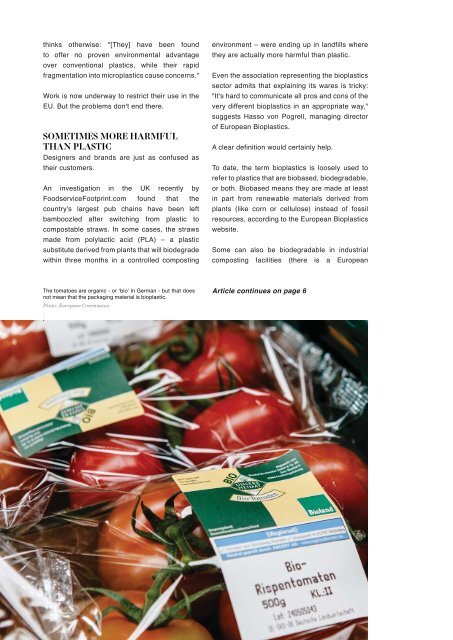Europe's Bioeconomy: The Business of Nature
EUobserver's 2018 Business in Europe magazine takes a closer look at Europe's bioeconomy and how "the business of nature" is changing the way people look at waste and natural resources.
EUobserver's 2018 Business in Europe magazine takes a closer look at Europe's bioeconomy and how "the business of nature" is changing the way people look at waste and natural resources.
Create successful ePaper yourself
Turn your PDF publications into a flip-book with our unique Google optimized e-Paper software.
thinks otherwise: "[<strong>The</strong>y] have been found<br />
to <strong>of</strong>fer no proven environmental advantage<br />
over conventional plastics, while their rapid<br />
fragmentation into microplastics cause concerns."<br />
Work is now underway to restrict their use in the<br />
EU. But the problems don't end there.<br />
SOMETIMES MORE HARMFUL<br />
THAN PLASTIC<br />
Designers and brands are just as confused as<br />
their customers.<br />
An investigation in the UK recently by<br />
FoodserviceFootprint.com found that the<br />
country's largest pub chains have been left<br />
bamboozled after switching from plastic to<br />
compostable straws. In some cases, the straws<br />
made from polylactic acid (PLA) – a plastic<br />
substitute derived from plants that will biodegrade<br />
within three months in a controlled composting<br />
environment – were ending up in landfills where<br />
they are actually more harmful than plastic.<br />
Even the association representing the bioplastics<br />
sector admits that explaining its wares is tricky:<br />
"It's hard to communicate all pros and cons <strong>of</strong> the<br />
very different bioplastics in an appropriate way,"<br />
suggests Hasso von Pogrell, managing director<br />
<strong>of</strong> European Bioplastics.<br />
A clear definition would certainly help.<br />
To date, the term bioplastics is loosely used to<br />
refer to plastics that are biobased, biodegradable,<br />
or both. Biobased means they are made at least<br />
in part from renewable materials derived from<br />
plants (like corn or cellulose) instead <strong>of</strong> fossil<br />
resources, according to the European Bioplastics<br />
website.<br />
Some can also be biodegradable in industrial<br />
composting facilities (there is a European<br />
<br />
<br />
Photo: European Commission<br />
Article continues on page 6<br />
04 — BUSINESS IN EUROPE MAGAZINE 2018

















